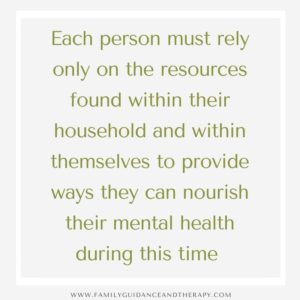This blog was written by Yana Bachynsky, LMFT
As a therapist, I cannot help but reflect that during a pandemic, people who have already been experiencing mental health issues are more at risk of them becoming worse.For instance, a person suffering from clinical depression might have developed some healthy coping skills, but unfortunately, those coping skills may not be able to be used during a contagious pandemic.
Going to the gym, participating in extracurricular activities after school, meeting with friends, celebrating holidays at restaurants, attending a macramé class—all gone. So, what do you do during a pandemic to make sure your mental health stays healthy?
Here are 12 Ways to Help Nourish Your Mental Health
As a mom, my task during this time is to develop an even deeper relationship with my son. On a very practical level, this time allows me to learn new games I can play with him. I can also have intimate conversations with my husband and spend time making new meals or doing other activities together
Now, each person must rely only on the resources found within their household and within themselves and their household.
This pandemic definitely will have repercussions for some time, so let’s look at some simple ways you can nourish your mental health during this time:
- Develop a deeper relationship with your family: Pre-COVID-19, some people have become robots doing the same thing every day. Wake up, wash up, breakfast, get ready for work, drive kids to school (if you have kids), drive to work, somehow get through a busy day, be stuck in traffic, take care of family…and it goes round and round. While everyone’s routine was different, each had one thing in common—it left you exhausted at the end of the day.
- Spend time tuning in to what’s important to you: Take out a journal and write about what is truly important to you. Topics you can focus on are: “What career path do I envision for myself?” or “ If I were to learn any new skill on a computer, what would it be?” or “ I want to improve my relationships in the following ways.”
- Draw near to your authentic self: It is healthy to experience the freedom to create and draw near to your authentic self that you may have forgotten in a busy world. Life’s challenges may have prevented you from getting in touch with yourself. Try out an activity-spend some time with a sheet of paper and colorful markers and brainstorm what matters to you on paper. Remember, you your life has a unique purpose!
- Pay attention to your senses: Don’t forget that while you were asked to stay at home, it doesn’t mean 24/7! Pick a time during the day to get out and take a walk. Experience the world around you by tuning into your senses: smell some flowers, listen to the birds sing, look at the trees, let the warm sun touch your skin and just relax outside for a few moments.
- Beautify your space: If you’re going to be at home, make it look great! It’s time to watch some videos on de-cluttering and interior design. You can start with a closet and just dump out or donate everything that you have not worn in over 6 months. You can also purge papers, books, magazines and other things that haven’t been used in a long while.
- Be present with those with whom you live: Now that so many of us are working from home, we need to take advantage of the extra time we find ourselves with to spend time with our families/roommates. We should put our work aside a few times a day to check in with those we live with. It’s a great alternative to social media, where ironically we are connecting instead to those who are miles away. Talk and spend time with those who are near you.
- Replace negative thoughts with positive ones: Negative thoughts might be bombarding you at this time. Fight against hopelessness and negative thoughts. Whenever you experience a negative thought, try to replace it with a positive one. For example, if you wake up in the morning and think: “COVID-19 will never end” try to replace it with “Medical professionals all over the world are doing their best in eliminating COVID-19 and coming up with a vaccine. They will eventually succeed.”
- Spot what is trendy: What will change after COVID-19? Will people see that they work better from home? Will many jobs move online? Will more people want to homeschool their kids? The whole world as we know it is changing. Think about how you will adapt on a post-pandemic planet.
- Do small acts of kindness to others: Doing good things to others may help you feel good. This time in our lives gives rise to an opportunity to be kind to others. For example, you can check in with your friends and neighbors over the phone. You can write a letter to someone who is lonely or donate money to a cause you believe in. Kindness is contagious, the more you spread it the more it comes back to you.
- Remember this is an adjustment to a new reality and you have strength to learn new things: In the past there have been things in your life you had to overcome for the first time—interviewing for a job, passing an exam, getting over a breakup. You have an incredible ability to adapt. If this time is specifically challenging, part of your resilience is seeking out mental health support. Don’t hesitate to reach out to your therapist and if you don’t have one reach out and we will help matching you with a right fit.

